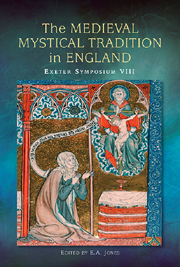 The Medieval Mystical Tradition in England
The Medieval Mystical Tradition in England Published online by Cambridge University Press: 05 July 2013
Behold! I have given you every herb … and every tree … and every beast … and every fowl … and every thing that creepeth ….
(Genesis 1: 29-30)Behold! I have seen the suffering of my people.
(Exodus 3: 7)Behold! I am laying in Zion a foundation stone.
(Isaiah 28: 16)Behold! I am sending my messenger.
(Malachi 3: 1)Behold! the bridegroom comes.
(Matthew 25: 6)Behold! You shall conceive.
(Luke 1: 31)Behold! I bring you good tidings.
(Luke 2: 10)Behold! the Lamb of God.
(John 1: 29)Behold! the hour comes.
(John 16: 32)Behold! I show you a mystery.
(I Corinthians 15: 51)Behold! he is coming with the clouds and everyone shall see him.
(Revelation 1: 7)Behold! the Lion of Judah.
(Revelation 5: 5)Behold! the tabernacle of God is within you.
(Revelation 21: 3)The argument of this paper is that recovering the biblical word behold and the work of silence - the model of the mind - it entails is crucial to understanding ancient, patristic and medieval texts. The word behold is a liminal word; it signals the threshold of contemplation, where the self-conscious mind stops analysing and becomes attentively receptive, open in an ungrasping and self-emptying way to irruption from the deep mind. Examples of this process will be drawn from Richard of St Victor's Mystical Ark, The Cloud of Unknowing and Julian's Long Text.
To save this book to your Kindle, first ensure [email protected] is added to your Approved Personal Document E-mail List under your Personal Document Settings on the Manage Your Content and Devices page of your Amazon account. Then enter the ‘name’ part of your Kindle email address below. Find out more about saving to your Kindle.
Note you can select to save to either the @free.kindle.com or @kindle.com variations. ‘@free.kindle.com’ emails are free but can only be saved to your device when it is connected to wi-fi. ‘@kindle.com’ emails can be delivered even when you are not connected to wi-fi, but note that service fees apply.
Find out more about the Kindle Personal Document Service.
To save content items to your account, please confirm that you agree to abide by our usage policies. If this is the first time you use this feature, you will be asked to authorise Cambridge Core to connect with your account. Find out more about saving content to Dropbox.
To save content items to your account, please confirm that you agree to abide by our usage policies. If this is the first time you use this feature, you will be asked to authorise Cambridge Core to connect with your account. Find out more about saving content to Google Drive.